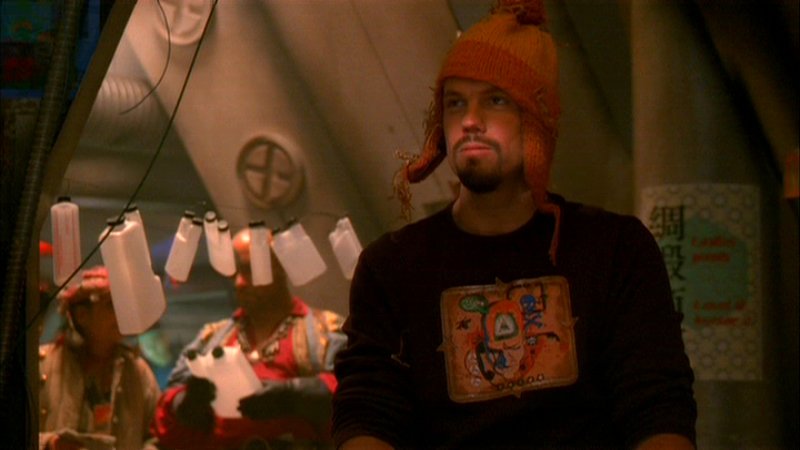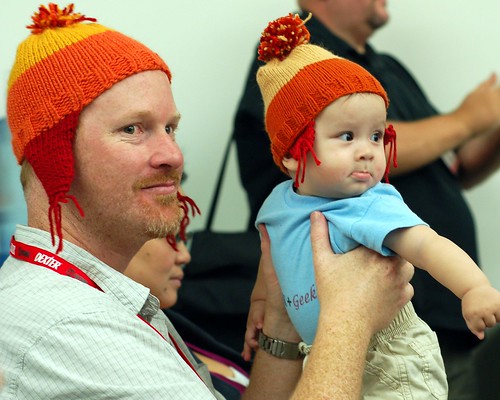Go read this story: “Firefly Hat Triggers Corporate Crackdown.” It’s a situation that is just so misguided. I’ll note that I’m taking the facts in the article as true; perhaps, as is often the case, there is more to the story.
But the article tells the story of a hat, this hat:

The hat is worn in one episode of Firefly, a show that aired on the Fox network for one season in 2002. Well, not even one full season, only 11 of 14 episodes were aired in the United States when the series first ran. The hat was worn in the 14th episode, seen only later by those enthusiastic enough to buy the DVD or catch it on reruns. It’s called “Jayne’s hat” because the character wearing the hat is named Jayne.
But Firefly has a huge fan base and one thing the fans did was adopt the hat to express their affection for the show:

For years the hats were handmade, with an Etsy industry around the hats. All was well and good until ten years after the show was cancelled, when Fox apparently decided there was money to be made. It licensed the manufacture of hats and threatened the fans making the hats.
Let’s look at the possible legal bases for the claim. First, there’s no copyright in the hat. It’s a “useful article,” which means that the copyright extends only to “pictorial, graphic, or sculptural features that can be identified separately from, and are capable of existing independently of, the utilitarian aspects of the article.” 17 U.S.C. § 101. There are no ornamental features of this hat that are original enough for copyright protection: it’s a standard design for a knitted hat, with standard ear-flaps, a standard pom-pom and standard stripes. So, no copyright.
Second, it’s probably not about the name “Jayne’s hat.” While a character name can be a trademark, like “The Hulk,” it doesn’t look like Fox has used “Jayne” with promotional merchandise in a way that gives it trademark rights in the name, nor does Fox own any trademark registrations for “Jayne.” And even if Fox had trademark rights in the name Jayne, arguably the word “Jayne” in “Jayne’s hat” is used in reference the character, like describing something as “Mickey Mouse ears.” Using it that way would not be infringing—pick your flavor of a nominative fair use doctrine or non-infringement analysis.
But, there is one more trademark question. The hat, in fact, symbolizes the show—that’s the very reason people wear it, to express their affection for the show. And in the United States, apparel worn by fans bearing a trademark must be made under license from the trademark owner.
Normally what’s licensed is an identifier that the team or musical group itself adopted, like a logo. But that’s not the limit: from LSU v. Smack Apparel Co. we know that a school’s team colors alone will symbolize the school, meaning that the sale of apparel with just the school colors, without name or logo, can be a trademark infringement. Even more recently, The Trademark Trial and Appeal Board found that the New York Yankees have trademark rights in “the Evil Empire,” even though the team didn’t adopt the phrase for itself and hadn’t registered it—because everyone knows who we’re talking about when we say the “Evil Empire.”
So we’ve reached full circularity in trademark law: fans adopt a symbol, their adoption reinforces the link between the symbol and the product, making the symbol a trademark which gives the owner enforceable rights, and the owner then proceeds to enforce them against the population that created the rights in the first place, it’s biggest fans.
The open source world has a similar dynamic, only it’s called “a community.” The difference is in the last step—there is no attack on the very group of people who created the thing of value, the code. Instead, the community welcomes everyone, knowing that everyone benefits, grows and becomes more passionate when they share a common interest.
Fox had a community most companies would kill for. But rather than embracing and fostering this passionate community, Fox took the short view. In knee-jerk fashion it exercised legal rights of questionable merit, acting autocratically and failing to recognize that it had something infinitely more valuable, the allegiance of a passionate community.
How much damage has Fox created—absolutely needlessly—because it didn’t try to find a way to embrace its community without alienating it? Fox took this great gift, a community, and sacrificed it for a few dollars. Instead, it could have had more of both, simply by thinking of itself as part of the community, not above it.

The text of this work is licensed under a Creative Commons Attribution-No Derivative Works 3.0 United States License.

Leave a Reply